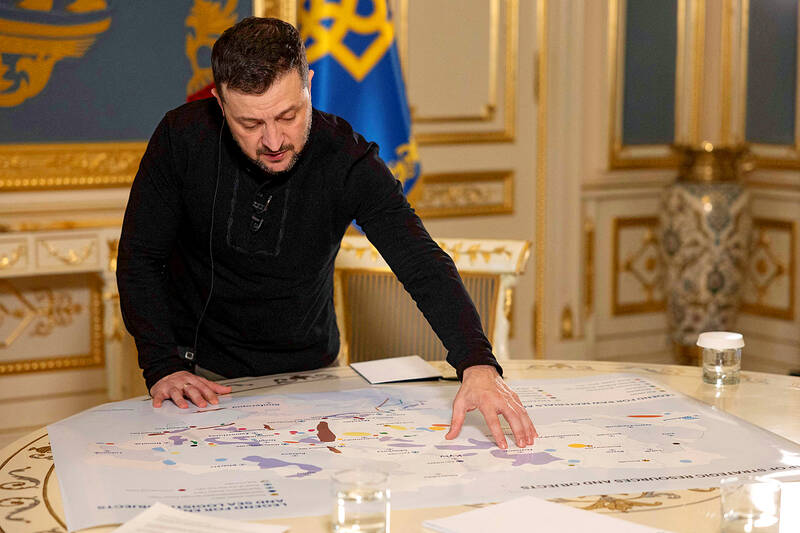Ukrainian President Volodymyr Zelenskiy on Friday pored over a once-classified map of vast deposits of rare earths and other critical minerals as part of a push to appeal to US President Donald Trump’s penchant for a deal.
The US president, whose administration is pressing for a rapid end to Ukraine’s war with Russia, on Monday said he wanted Ukraine to supply the US with rare earths and other minerals in return for financially supporting its war effort.
“If we are talking about a deal, then let’s do a deal, we are only for it,” Zelenskiy said, emphasizing Ukraine’s need for security guarantees from its allies as part of any settlement.

Photo: Reuters
Ukraine floated the idea of opening its critical minerals to investment by allies in fall last year, as it presented a “victory plan” that sought to put it in the strongest position for talks and force Moscow to the table.
Zelenskiy said less than 20 percent of Ukraine’s mineral resources, including about half its rare earth deposits, were under Russian occupation.
Rare earths are important in the manufacture of high-performance magnets, electric motors and consumer electronics.
Zelenskiy said Moscow could open those resources to its allies North Korea and Iran, both sworn US enemies.
“We need to stop Putin and protect what we have — a very rich Dnipro region, central Ukraine,” he said.
Russian troops have been gaining ground in the east for months, throwing huge resources into an unrelenting offensive, while Kyiv’s much smaller army grapples with a shortage of soldiers and frets over future weapons supplies from abroad.
On Friday, Russia said its forces had seized the key mining town of Toretsk in east Ukraine, the biggest settlement Moscow claims to have captured since Avdiivka in February last year. Kyiv denied Russia had full control of the industrial hub.
Zelenskiy unfurled a map on a table in the heavily-defended president’s office in Kyiv, showing numerous mineral deposits, including a broad strip of land in the east marked as containing rare earths. About half of it looked to be on Russia’s side of the current front lines.
He said Ukraine had Europe’s largest reserves of titanium, essential for the aviation and space industry, and uranium, used for nuclear energy and weapons.
Many of the titanium deposits were marked in northwestern Ukraine, far from the fighting.
Ukraine has rapidly retuned its foreign policy approach to align with the transactional world view set out by the new occupant of the White House, Ukraine’s most important ally.
However, Zelenskiy emphasized that Kyiv was not proposing “giving away” its resources, but offering a mutually beneficial partnership to develop them jointly.
“The Americans helped the most, and therefore the Americans should earn the most, and they should have this priority, and they will. I would also like to talk about this with President Trump,” he said.
Zelenskiy said Kyiv and the White House were also discussing using Ukraine’s vast underground gas storage sites to store US liquefied natural gas (LNG).
“I know that the Trump administration is very interested in it... We’re ready and willing to have contracts for LNG supplies to Ukraine, and of course, we will be a hub for the whole of Europe,” he said.
Trump on Friday said he would “probably” meet Zelenskiy next week, but the Ukrainian president did not confirm the meeting.
On the battlefield, Zelenskiy said that North Korean troops were back on the front line in Russia’s Kursk region, after reports Moscow had withdrawn them after sustaining heavy losses.
“There have been new assaults in the Kursk operation areas ... the Russian army and North Korean soldiers have been brought in again,” Zelenskiy said in his evening address.
Additional reporting by AFP

NO EXCUSES: Marcos said his administration was acting on voters’ demands, but an academic said the move was emotionally motivated after a poor midterm showing Philippine President Ferdinand Marcos Jr yesterday sought the resignation of all his Cabinet secretaries, in a move seen as an attempt to reset the political agenda and assert his authority over the second half of his single six-year term. The order came after the president’s allies failed to win a majority of Senate seats contested in the 12 polls on Monday last week, leaving Marcos facing a divided political and legislative landscape that could thwart his attempts to have an ally succeed him in 2028. “He’s talking to the people, trying to salvage whatever political capital he has left. I think it’s

Polish presidential candidates offered different visions of Poland and its relations with Ukraine in a televised debate ahead of next week’s run-off, which remains on a knife-edge. During a head-to-head debate lasting two hours, centrist Warsaw Mayor Rafal Trzaskowski, from Polish Prime Minister Donald Tusk’s governing pro-European coalition, faced the Eurosceptic historian Karol Nawrocki, backed by the right-wing populist Law and Justice party (PiS). The two candidates, who qualified for the second round after coming in the top two places in the first vote on Sunday last week, clashed over Poland’s relations with Ukraine, EU policy and the track records of their

UNSCHEDULED VISIT: ‘It’s a very bulky new neighbor, but it will soon go away,’ said Johan Helberg of the 135m container ship that run aground near his house A man in Norway awoke early on Thursday to discover a huge container ship had run aground a stone’s throw from his fjord-side house — and he had slept through the commotion. For an as-yet unknown reason, the 135m NCL Salten sailed up onto shore just meters from Johan Helberg’s house in a fjord near Trondheim in central Norway. Helberg only discovered the unexpected visitor when a panicked neighbor who had rung his doorbell repeatedly to no avail gave up and called him on the phone. “The doorbell rang at a time of day when I don’t like to open,” Helberg told television

A team of doctors and vets in Pakistan has developed a novel treatment for a pair of elephants with tuberculosis (TB) that involves feeding them at least 400 pills a day. The jumbo effort at the Karachi Safari Park involves administering the tablets — the same as those used to treat TB in humans — hidden inside food ranging from apples and bananas, to Pakistani sweets. The amount of medication is adjusted to account for the weight of the 4,000kg elephants. However, it has taken Madhubala and Malika several weeks to settle into the treatment after spitting out the first few doses they